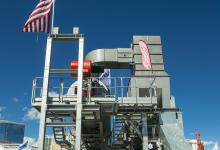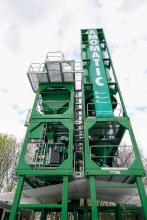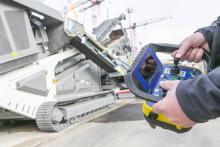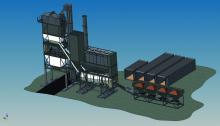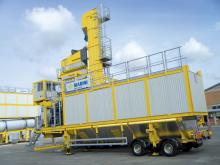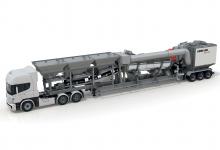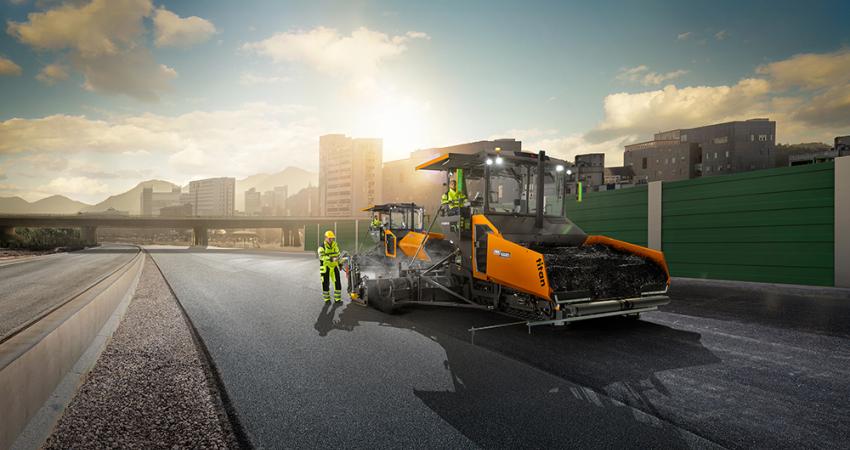The Fayat Group is developing its asphalt plant range with its Marini-Ermont product offerings - Mike Woof writes
The Fayat Group is a major player in the global asphalt plant sector with its Marini and Ermont brands and is further developing both product ranges. The latest machines have been designed to cater to a wide array of customer needs, from large, fixed high-production plants to its compact super portable units, as well as from high sophistication down to more basic technology for developing mar
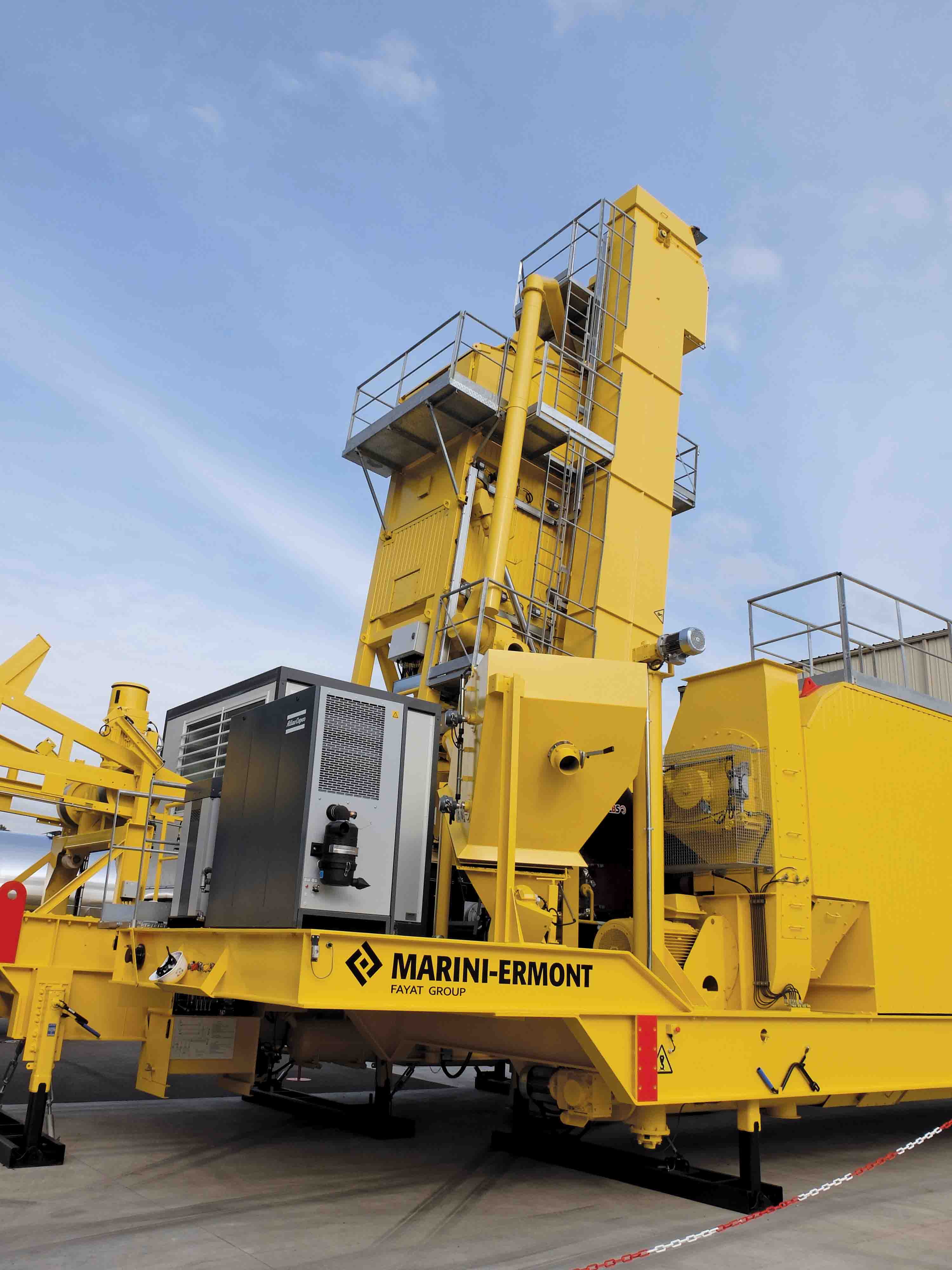
The new Marini-Ermont plants are designed for fast erection on site
The Fayat Group is developing its asphalt plant range with its Marini-Ermont product offerings - Mike Woof writes
The2779 Fayat Group is a major player in the global asphalt plant sector with its 273 Marini and 211 Ermont brands and is further developing both product ranges. The latest machines have been designed to cater to a wide array of customer needs, from large, fixed high-production plants to its compact super portable units, as well as from high sophistication down to more basic technology for developing markets. There are different concepts for mobility including the portable, mobile, super mobile and super portable plants. The machines are made at facilities in Brazil, China, France and Italy.
The Fayat Group offers customers a wide range of units, including a choice of both continuous plants with outputs from 80-650tonnes/hour, as well as batching plants with outputs from 80-400tonnes/hour. Efficiency is key to all the Fayat asphalt plants according to the firm, as well as reliability and product quality.
As with its main rivals in the asphalt plant sector, the Fayat Group has been working hard to develop efficient and effective solutions for using recycled asphalt pavement (RAP).
The firm has extensive facilities for research and design at the Lorette plant, with the dosing software and computer software being developed at the factory as well as the machines themselves. The software technology allows the facility to carry out continuous monitoring of plants from the facility. Software updates can be provided remotely and customers can ask the factory to provide or carry out fault diagnosis in the event of a problem with a plant onsite.
Laurent Bianzini is general manager of the Ermont factory and said that the firm has a focus on innovation and service. “Innovation is crucial. We have moved forward with our innovation and growth strategy.”
Because of its investment in new technology, Marini-Ermont has introduced many new technologies for the asphalt plant sector in recent months. Hervé Riche is research and development manager at Ermont and he said that the firm is keen to further develop its technology for using RAP in the feed as it recognises that by 2020 over 70% of construction waste onsite will have to be recycled. Riche explained that running RAP into a conventional hot mix plant runs the risk of overheating the material and damaging the bitumen. As a result, indirect heating is the more accepted way to allow the use of RAP in the feed, while oversized mixers are typically used for recycling applications.
He said that the firm’s TSM continuous plants can process up to 40% RAP in the feed, while the firm’s Retrofiux machines can cope with up to 50%. However the FRT units can handle up to 70% RAP in the feed. And he added, “We’re working on up to 100% recycled feed.”
The Retrofiux plants are designed with a RAP injection system located behind the flame, which limits the damage to the binder, while there is also a new system to preheat the aggregates. The heat exchange process takes around 25 seconds, which includes the wet mixing time.
The firm’s TSM plants meanwhile have protection for the RAP from the flame, but the Retrofiux plants have lower emissions levels as well as an optimised chute design and a special recycling loop.
The TSM17 plant is a drum dryer mixer, with the flame travelling in the same direction as the mix, unlike a counter-flow type plant. The unit is able to produce from 80-230tonnes/ hour of a high quality mix at 2% moisture that is said to be very homogenous. The plant is designed to handle recycled feed efficiently and has a 13MW burner, while versatility is said to be good as customers can select different fuel choices including light oil, heavy oil, liquid gas or kerosene.
There are several other recent additions to the range of asphalt plants from the group. The RM160 is designed to handle up to 25-30% of RAP in the feed and produces 160tonnes/hour at 2% moisture. Built along similar lines, the new RM120 Allroad has been designed to allow for a higher road clearance than most competing units so that it can be transported to site along unmade roads. This plant has a maximum throughput of 120tonnes/hour and the firm says that the unit is able to produce any kind of road materials and be transported along any kind of road. The plant offers 500mm of clearance and can fit on two or three axles, depending on transport regulations. The firm explained that all the major components can be carried in one load and that the upper parts of the machine are foldable, while it is fitted with six adjustable legs. This design allows the machine to be set out on any site without the need for a crane and set up times are reduced. The material quality is as good as for any Marini plant as it features the same weighing and dosing technology, with a 90-second mix time, as well as the firm’s latest seventh generation software. The firm says that the plant can produce a high-quality mix with low energy consumption and it can handle a RAP feed of 40%, although this does require some changes from the standard specification. The RM120 is also said to be able to use a higher percentage of RAP in the feed than many competing units in its class. The optimised burner design maximises efficiency and minimises fuel use according to the firm.
Maintenance is also said to be easy and when the flights need changing, a rope system is fitted to make the task easier.
The Roadbatch RB160 produces a high-quality mix and features sophisticated technology for dosing, mixing and automation systems. There are two versions, with one able to produce 160tonnes/hour at 3% moisture while the other can produce 160tonnes/hour at 5% moisture. Designed to be easy to transport and fast to commission, the RB160 is designed with two large hydraulic cylinders that can raise the tower into position. The plant can be ready for use within 30 minutes of arrival onsite and is also versatile, as it can handle up to 30% of RAP in its feed. The firm says that this is a premium batch plant that offers accurate dosing, while its hopper can contain 16tonnes of aggregates and quality materials.
The RF160 plant can deliver up to 160tonnes/hour at 5% moisture and with as much as 50% RAP in the feed. “It can be installed as a mobile or a stationary plant.” For the mobile variant the plant can be fitted inside containers for easier transport and can also be fitted with steel base units for faster installation onsite. Other features include a maintenance-free recycling system and a locking device for safety, when an operator is inside the drum for maintenance work.
The Packliner Compact is a highly mobile machine designed for ease of transport that can be used to produce cold mix. Riche said, “It produces a high quality mix with maximum efficiency and integrates all the technology.” Weighing 10-13tonnes depending on the specification, the plant can produce 100tonnes/ hour and is fitted with two bins as standard, although a third can be added if required. He added, “There is a screw auger on the top so it can feed cement or gravel.”
The plant is designed for mobility and he said, “It can be integrated in a container or in nine semi-trailers. With hydraulic legs it is very easy to put it in a trailer and it can be ready to operate in 30 minutes.”
Customer support is another crucial factor for Fayat and Bianzini explained that this is why the firm has set up a training facility at the Lorette facility, which is used to give instruction to operators from amongst its clients. This is a major step forward for customer support in Europe and is able to provide a wide array of training courses including instruction on asphalt plants, cold mixers, bitumen plants and emulsion plants.
The training is not limited to theoretical, classroom work and Bianzini said that Fayat’s investment included setting up equipment for hands-on training. Working scale models of different types of asphalt plant can be operated using proper control systems, allowing trainees to undergo courses with a 50:50 mix of practical and theoretical training sessions. “Before it was 90% theory and it was very important to invest in this. It’s important to have a model for training as it gives a better understanding of the machines.”
The
The Fayat Group offers customers a wide range of units, including a choice of both continuous plants with outputs from 80-650tonnes/hour, as well as batching plants with outputs from 80-400tonnes/hour. Efficiency is key to all the Fayat asphalt plants according to the firm, as well as reliability and product quality.
As with its main rivals in the asphalt plant sector, the Fayat Group has been working hard to develop efficient and effective solutions for using recycled asphalt pavement (RAP).
The firm has extensive facilities for research and design at the Lorette plant, with the dosing software and computer software being developed at the factory as well as the machines themselves. The software technology allows the facility to carry out continuous monitoring of plants from the facility. Software updates can be provided remotely and customers can ask the factory to provide or carry out fault diagnosis in the event of a problem with a plant onsite.
Laurent Bianzini is general manager of the Ermont factory and said that the firm has a focus on innovation and service. “Innovation is crucial. We have moved forward with our innovation and growth strategy.”
Because of its investment in new technology, Marini-Ermont has introduced many new technologies for the asphalt plant sector in recent months. Hervé Riche is research and development manager at Ermont and he said that the firm is keen to further develop its technology for using RAP in the feed as it recognises that by 2020 over 70% of construction waste onsite will have to be recycled. Riche explained that running RAP into a conventional hot mix plant runs the risk of overheating the material and damaging the bitumen. As a result, indirect heating is the more accepted way to allow the use of RAP in the feed, while oversized mixers are typically used for recycling applications.
He said that the firm’s TSM continuous plants can process up to 40% RAP in the feed, while the firm’s Retrofiux machines can cope with up to 50%. However the FRT units can handle up to 70% RAP in the feed. And he added, “We’re working on up to 100% recycled feed.”
The Retrofiux plants are designed with a RAP injection system located behind the flame, which limits the damage to the binder, while there is also a new system to preheat the aggregates. The heat exchange process takes around 25 seconds, which includes the wet mixing time.
The firm’s TSM plants meanwhile have protection for the RAP from the flame, but the Retrofiux plants have lower emissions levels as well as an optimised chute design and a special recycling loop.
The TSM17 plant is a drum dryer mixer, with the flame travelling in the same direction as the mix, unlike a counter-flow type plant. The unit is able to produce from 80-230tonnes/ hour of a high quality mix at 2% moisture that is said to be very homogenous. The plant is designed to handle recycled feed efficiently and has a 13MW burner, while versatility is said to be good as customers can select different fuel choices including light oil, heavy oil, liquid gas or kerosene.
There are several other recent additions to the range of asphalt plants from the group. The RM160 is designed to handle up to 25-30% of RAP in the feed and produces 160tonnes/hour at 2% moisture. Built along similar lines, the new RM120 Allroad has been designed to allow for a higher road clearance than most competing units so that it can be transported to site along unmade roads. This plant has a maximum throughput of 120tonnes/hour and the firm says that the unit is able to produce any kind of road materials and be transported along any kind of road. The plant offers 500mm of clearance and can fit on two or three axles, depending on transport regulations. The firm explained that all the major components can be carried in one load and that the upper parts of the machine are foldable, while it is fitted with six adjustable legs. This design allows the machine to be set out on any site without the need for a crane and set up times are reduced. The material quality is as good as for any Marini plant as it features the same weighing and dosing technology, with a 90-second mix time, as well as the firm’s latest seventh generation software. The firm says that the plant can produce a high-quality mix with low energy consumption and it can handle a RAP feed of 40%, although this does require some changes from the standard specification. The RM120 is also said to be able to use a higher percentage of RAP in the feed than many competing units in its class. The optimised burner design maximises efficiency and minimises fuel use according to the firm.
Maintenance is also said to be easy and when the flights need changing, a rope system is fitted to make the task easier.
The Roadbatch RB160 produces a high-quality mix and features sophisticated technology for dosing, mixing and automation systems. There are two versions, with one able to produce 160tonnes/hour at 3% moisture while the other can produce 160tonnes/hour at 5% moisture. Designed to be easy to transport and fast to commission, the RB160 is designed with two large hydraulic cylinders that can raise the tower into position. The plant can be ready for use within 30 minutes of arrival onsite and is also versatile, as it can handle up to 30% of RAP in its feed. The firm says that this is a premium batch plant that offers accurate dosing, while its hopper can contain 16tonnes of aggregates and quality materials.
The RF160 plant can deliver up to 160tonnes/hour at 5% moisture and with as much as 50% RAP in the feed. “It can be installed as a mobile or a stationary plant.” For the mobile variant the plant can be fitted inside containers for easier transport and can also be fitted with steel base units for faster installation onsite. Other features include a maintenance-free recycling system and a locking device for safety, when an operator is inside the drum for maintenance work.
The Packliner Compact is a highly mobile machine designed for ease of transport that can be used to produce cold mix. Riche said, “It produces a high quality mix with maximum efficiency and integrates all the technology.” Weighing 10-13tonnes depending on the specification, the plant can produce 100tonnes/ hour and is fitted with two bins as standard, although a third can be added if required. He added, “There is a screw auger on the top so it can feed cement or gravel.”
The plant is designed for mobility and he said, “It can be integrated in a container or in nine semi-trailers. With hydraulic legs it is very easy to put it in a trailer and it can be ready to operate in 30 minutes.”
Customer support is another crucial factor for Fayat and Bianzini explained that this is why the firm has set up a training facility at the Lorette facility, which is used to give instruction to operators from amongst its clients. This is a major step forward for customer support in Europe and is able to provide a wide array of training courses including instruction on asphalt plants, cold mixers, bitumen plants and emulsion plants.
The training is not limited to theoretical, classroom work and Bianzini said that Fayat’s investment included setting up equipment for hands-on training. Working scale models of different types of asphalt plant can be operated using proper control systems, allowing trainees to undergo courses with a 50:50 mix of practical and theoretical training sessions. “Before it was 90% theory and it was very important to invest in this. It’s important to have a model for training as it gives a better understanding of the machines.”

